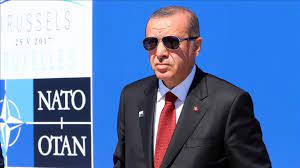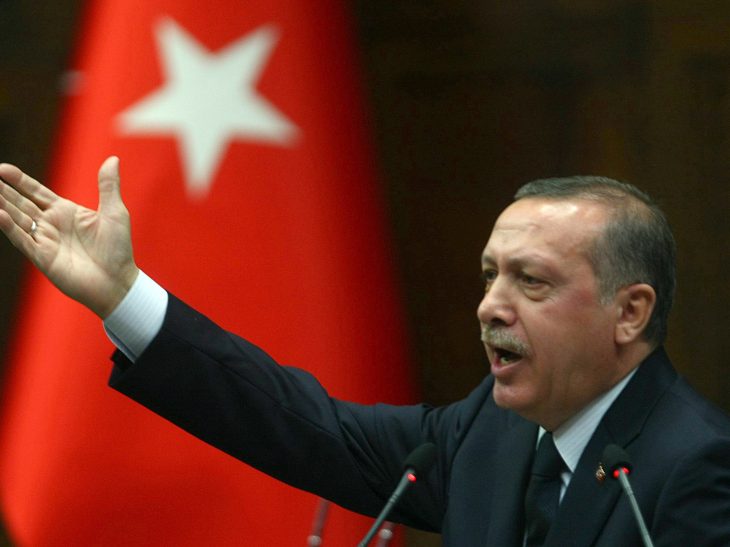WSJ: NATO’s Electoral Message for Erdoğan
 NATO
NATO
By The alliance ought to put Ankara’s membership on the chopping block if the Turkish president meddles in the upcoming contests.
With Recep Tayyip Erdoğan at the helm, Turkey is again “the sick man of Europe,” albeit for reasons different from those that inspired the original 19th-century epithet. Mr. Erdoğan’s performance has consistently been divisive and dangerous. His belligerent regional policies have been similarly perilous, from subverting key elements of Turkey’s post-Ottoman secular constitution to repeatedly compromising its financial system and economic stability. Turkey is a member of the North Atlantic Treaty Organization, but it isn’t acting like an ally.
Yet there’s a chance he can be stopped, if the West takes bold action to help ensure his domestic opposition gets a fair shake in upcoming presidential elections. To do so, the alliance ought to put Ankara’s membership on the chopping block. Considering expulsion now will allow for the alliance to debate the pros and cons of its membership and emphasize—both to Turkish voters and NATO members—the high stakes of the coming election.
Turkish voters will have a chance to take their country back in June, or May if Mr. Erdoğan manipulates the polling schedule. Opposition candidates stand a real chance. They won key municipal elections in 2019, in cities including Istanbul, Ankara and Izmir. This was despite Mr. Erdoğan’s efforts to corrupt the electoral process by using prosecutions to cripple the opposition and filing trumped-up charges against its leaders, including the Istanbul mayor he tried so hard to defeat.
There are troubling signs of similar behavior this time around. Mr. Erdoğan and his allies are accusing the opposition of disloyalty to Turkey and harassing the few independent media that remain in the country. Mr. Erdoğan is likely to pile on additional measures against Turkey’s Kurds, such as defunding one of its main political parties, and arrest followers of the dissident cleric Fethullah Gülen on specious terrorism charges.
The West can prevent this outcome by putting a spotlight on Mr. Erdoğan’s duplicity by encouraging increased international monitoring and media reporting of the Turkish elections. NATO, likewise, can make clear that Turkey’s failure to conduct free and fair elections would be the final trigger in deciding whether to revoke its NATO membership. The alliance’s founding charter doesn’t provide for expulsion or suspension, but the international-law principle of rebus sic stantibus—“as things now stand”—provides more than ample basis to do so. NATO’s governing body, the North Atlantic Council, would have plenary authority to take the necessary measures to protect its institutional security.
No country is entitled to participate in the alliance, and Mr. Erdoğan hasn’t been behaving like an ally. His worst offense in recent years was purchasing Russia’s sophisticated S-400 air-defense system in December 2017. That decision was incompatible with existing NATO defense measures and compromised America’s F-35 stealth technology, thereby threatening the security of NATO allies and Middle Eastern partners.
President Trump should have promptly imposed strict sanctions under the Countering America’s Adversaries Through Sanctions Act, but his affinity for Mr. Erdoğan and Vladimir Putin prevailed. Sanctions weren’t announced until Dec. 14, 2020—after Turkey had accepted delivery and begun testing the S-400s, and after Mr. Trump had lost re-election. Congress barred Turkey from F-35 production and sales in 2018-19, but Mr. Trump’s delays in approving sanctions sent mixed signals, further encouraging Mr. Erdoğan’s intransigence.
Other aspects of Mr. Erdoğan’s foreign policy are equally treacherous. He holds “neo-Ottoman” aspirations of regaining Turkey’s influence in Middle Eastern affairs. These drove his effort to establish Turkish hegemony over northern Syria amid the country’s civil war. Expressed at times in direct threats to insert Turkish forces where potentially dangerous contact with U.S. and U.S.-led coalition forces was likely, Ankara endangered American efforts to defeat ISIS’ territorial caliphate, prevent its resurgence and keep Islamist prisoners incarcerated inside Syria. During the lengthy post-Arab Spring regional wars, Mr. Erdoğan has blackmailed Europe by enabling refugee flows through Turkey into neighboring countries, all while meddling in the anarchy that prevails across Syria. His consistent antagonism toward Israel similarly reflects his broader hegemonic designs in the Middle East.
While Mr. Erdoğan won plaudits for providing Ukraine with drones after Russia’s February 2022 invasion, the move was more a publicity stunt to advertise his drone program and shouldn’t obscure his continuing threats elsewhere. Perhaps the most visible of these is his scheme to obstruct NATO membership for Finland and Sweden, extorting measures to assist his anti-Kurdish crusade and suppress dissent inside Turkey and the Turkish diaspora. This thuggish treatment of the two applicants—whose admission is supported by the entire alliance except Hungary—is classic Erdoğan behavior. The White House is apparently conditioning sales of F-16s to Turkey on supporting Finnish and Swedish accession, but congressional opposition to the sales is strong, reflecting widespread U.S. discontent with Turkey’s obstructionism.
Turkish and outside observers agree that Mr. Erdoğan will be defeated in the election if the process is free and fair and the opposition stays sufficiently united to wage an effective campaign. It will be much harder for him to subvert the vote if NATO brings international attention to his efforts with the threat of expulsion. And if Mr. Erdoğan manages to steal the presidential and legislative elections, NATO can no longer afford to ignore the damage he has inflicted on the alliance and its members.
Seriously considering Turkey’s expulsion or the suspension of its membership is obviously a grave business. But things will only get worse if the alliance fails to confront Mr. Erdoğan’s poisonous behavior.
Mr. Bolton is author of “The Room Where It Happened: A White House Memoir.” He served as the president’s national security adviser, 2018-19, and ambassador to the United Nations, 2005-06.



